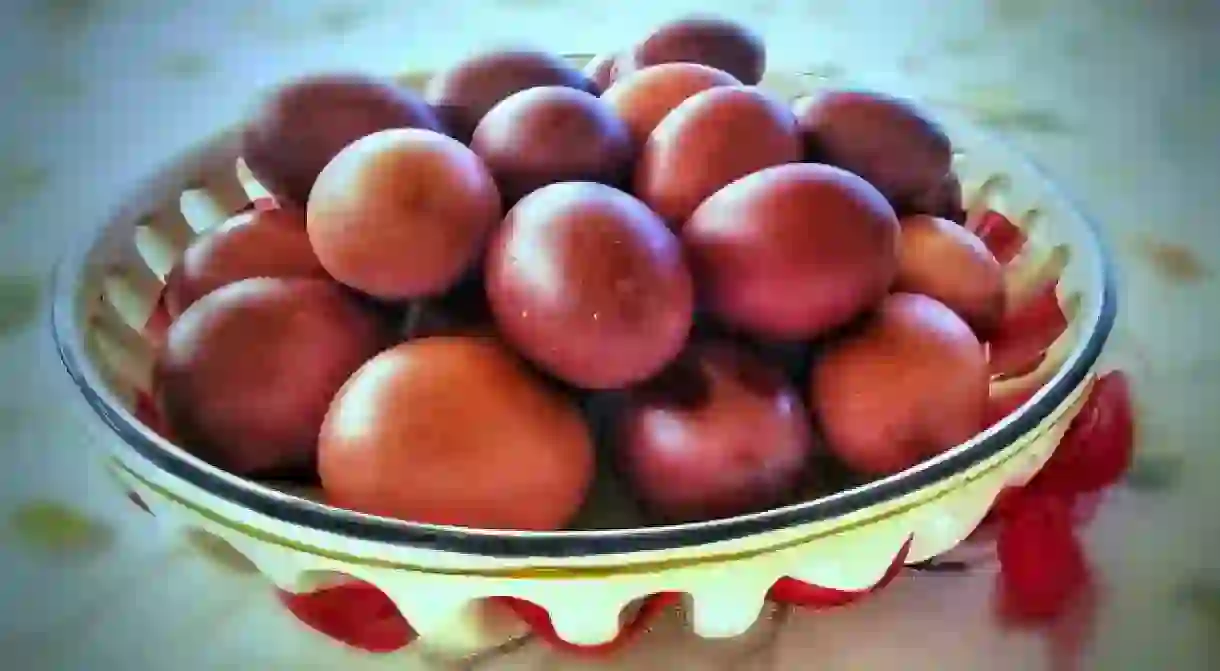How to Celebrate Easter Like a Georgian

Georgia is a religious country. It follows the Christian faith, and celebrating Easter is the most important holiday of the year. With red-colored eggs, special meals, and desserts prepared during the festive days, Georgians love celebrating Easter. And if your trip coincides with the holiday, make sure to know how to celebrate in like a local.
Fast prior to Easter
Those Georgians who are religious fast for 40 days prior to the holiday, and for almost two months they don’t eat meat, dairy, fish, or eggs.
Grow Easter grass
Locals start to grow Easter grass one week before Easter Sunday, i.e. on Palm Sunday. They wet cotton pads in water and place them on a plate; they sprinkle a handful of wheat on the plate and wait for it to grow. Christians believe that green grass symbolizes the new life Christ gave us with his resurrection.

Dye eggs red
Red Friday is the day when every household dyes eggs red before the sunset. Madder roots or red onion peels are the main ingredients, and boiling them produces a red color. However, sometimes if the peels or roots are not of good quality, the eggs turn out a different color than blood red. It’s believed that eggs symbolize the rebirth of Christ and eternal life.

Attend a church ceremony
The most significant part of the celebration is the miraculous appearance of the Holy Fire in Jerusalem a day before Easter Sunday. Thus, religious Georgians go to church in the evening to participate in the celebratory service and ritual called Litonioba. They pray, listen to the Catholicos-Patriarch and wait for the delegation to bring the Holy Fire. The whole process lasts until the early morning.
Congratulate everyone
On Easter Sunday, before Georgians say “hello” to each other, it is customary to say “Christ has Risen!” The response “Indeed He has Risen!” is then given before continuing the conversation.
Crack the eggs
Cracking those red-colored eggs is another custom with which Georgians start the day. They choose some of the strongest eggs from the batch by slightly rapping it on their teeth. Those eggs that make a clear sound tend to be the strongest. Each member of the household chooses their strongest egg and starts to crack it by tapping both sides of eggs on each other. Whoever has the fewest broken eggs is the winner.

Prepare Easter meals
On Easter Sunday, besides red eggs, Georgians prepare a special meal – a sheep-meat stew with green plums called chakapuli and a hill-shaped cake paska. Baking paska requires a lot of time, patience, and effort. The typical paska has raisins inside, but some also include different types of confit. However, if you are not up for baking, there are plenty of paska sold in supermarkets or at pastry shops.

Pay respect to the dead
On Monday, Georgians tend to visit graveyards of their relatives and pay respect to the dead. However, due to heavy traffic on Mondays in the city, some families even do that on Sunday. Visiting graveyards has a sacred meaning for many locals. Under Soviet rule, churches in the country were closed, thus Georgians started to go to graveyards to pray. They would light up a candle at the gravestone and sit for a while. Even after the collapse of the Soviet Union, the tradition still remains.
As Easter marks the resurrection of Christ and symbolizes eternal life, Georgians celebrate the holiday with their entire family, living or dead. Therefore, you won’t see sad faces on graveyards, they come here to reunite with their relatives and let them know that Christ has resurrected.
It’s customary to give a toast in respect of the deceased, thus there is always a small feast. When drinking and toasting the dead, Georgians pour a small portion of wine on the grave. They call it “knocking over a goblet.” Usually, those traditions leave foreigners astonished. However, the idea behind it is that Georgians express a hope that they won’t be alone in the afterlife, and that their relatives will also come to visit their resting place and remember them.













